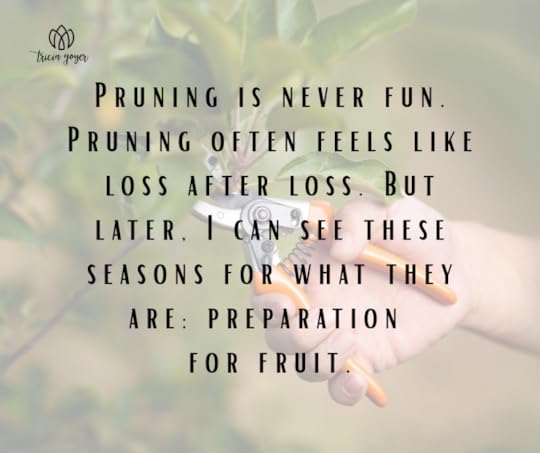Tricia Goyer's Blog, page 4
September 9, 2025
Growth Doesn’t Happen in Straight Lines
 Tricia Goyer
Tricia GoyerI’ve always admired a freshly mowed lawn. The rows are neat and tidy, straight as a ruler. But here’s the thing: living things don’t actually grow that way. Grass may be trimmed into lines, but its growth? It’s wild, reaching in every direction, bending toward the light, stretching for water, responding to seasons. Straight lines are only found in stationary, solid things—like buildings or fences.
Since we are living things, our growth also doesn’t happen in a straight line. I’ve often seen the most growth in my spirit and character during seasons of dark clouds and rain. My roots have stretched deeper toward Jesus during dry seasons when a surface-level Christianity wasn’t enough. Currently, I find myself stretching to the light. After my sweet Grandma’s passing, I’m drawn to God’s glory. This morning I read about His glory filling the temple, and it brought me such peace—there is more we can experience with God in eternity. This is precisely the light my soul needed today!
When I pause long enough to notice, my life reflects more of a vineyard than a fence post. God’s Word tells me this is true. Jesus said:
“I am the true grapevine, and my Father is the gardener. He cuts off every branch of mine that doesn’t produce fruit, and He prunes the branches that do bear fruit so they will produce even more.” —John 15:1–2 (NLT)Whatever season we’re in, when can continue to grow, whether it is upward toward heaven or deeper toward Christ. The good news is that God Himself is part of the stretching and pruning.
 Stretching and Pruning
Stretching and PruningOh, how I wish my growth could be as easy as clicking “upgrade” on my phone. During stretching seasons, I reach toward heaven because I need God more. When my heart aches, I need the peace I can only find in Jesus.
There are also pruning seasons when God cuts away the extra—my need for control, my striving for approval, my busyness that leaves little room for Him. (Can you relate?) Pruning is never fun. Pruning often feels like loss after loss. But later, I can see these seasons for what they are: preparation for fruit.
In the book The Girl’s Still Got It, Liz Curtis Higgs says,
“Hard times are purposeful, meant to refine and redirect us. They’re not arbitrary or random, and they’re definitely not cruel.”
Liz Curtis Higgs
Or we can put it this way, “Darling, pruning hurts, but it sure beats rotting on the vine.”
Tending and Root-DeepeningGrowth also comes from tending. It helps to know that God is the one who is faithfully watering the soil of my soul through His Word, through prayer, through wise friends who aren’t afraid to speak truth.
Sometimes, God uses circumstances I’d never choose to deepen my roots. And storms? They forced me to anchor myself in Him, not in my own shaky strength. Storms are often the thing that helps us take our eyes off everything that seems so very important and focus them back on Jesus.
Lysa TerKeurst said, “We steer where we stare.” She shared this insight during the Lifeway Women’s Leadership Forum in 2017, and it was later summarized in a Lifeway Voices blog post, where she explained:
“We start to steer where we stare. The enemy doesn’t have to get real clever because we just tell him what we’re fixated on.”
Lysa terkeurst
When I stare only at the struggles, I miss the Gardener’s hands at work. But when I fix my eyes on Jesus, I start to see that even the tangled parts of my story are drawing me deeper into Him.
A Living StoryIf my life had been a straight line, I would’ve missed so much. I would have missed the detours that led to adoption, to books I never expected to write, and the heart-to-heart ministry I never imagined. God’s best work often comes in the zigzags, in the moments that appear to be setbacks but are actually setups.
So if your growth feels messy, remember: that’s because you’re alive. Dead things don’t bend, stretch, or reach for the light. But you? You are living, breathing, becoming.
Friend, let’s not despise the pruning or the crooked paths. They are proof that the Gardener is at work, making us fruitful for His glory. Because living things don’t grow in straight lines—they grow toward the Son.
Additional ResourcesWalk it Out
If this message encouraged you, you’ll love my book Walk It Out. In it, I share how true fulfillment comes when we align our steps with God’s Word—caring for the needy, loving the forgotten, and living out His purposes even when the path feels anything but straight. Discover how walking in God’s ways can spark passion, mission, and joy in your everyday life.
Sometimes those steps are easy, but many times they require a move outside of what feels safe or secure. When we stop focusing on their own dreams and purposes, and instead focus on God’s dreams and purposes, everything changes.
Get your copy here on Amazon today.
Daily Bible Podcast
We’re Tricia and Michelle, two friends inviting you to join us in reading through the Bible chronologically this year. Reading the Bible every day can be a challenge. We’re here to summarize each day’s passage and provide action steps … in under 15 minutes. Grab a buddy and join our community. Take the plunge, and let’s read through the Bible together. We’ll be cheering you on all the way!
Find us on YouTube or your favorite podcast platform, or head over to our website to get started!
The post Growth Doesn’t Happen in Straight Lines appeared first on Tricia Goyer.September 8, 2025
More Jesus, Not Another Lesson Plan
 Tricia Goyer
Tricia GoyerWhen many families turn to homeschooling, it’s often because of faith. We want the freedom to teach our children about God. We long to have the greatest influence in their lives—not the school system, not their peers, not even the culture around them.
But somewhere along the way, we get distracted.
The stacks of curriculum call to us. Lesson plans, co-ops, and field trips fill our calendars. And while those things have value, they can also quietly shift our focus away from what matters most.
Yes, because we’re home with our kids, we spend time on character and moral training. We teach kindness, obedience, and responsibility. Yet even this, if not rooted in Christ, can drift into a checklist rather than discipleship.
“For the Lord is the Spirit, and wherever the Spirit of the Lord is, there is freedom.” (2 Corinthians 3:17 NLT)Homeschooling isn’t ultimately about raising smart kids, well-mannered kids, or even successful kids. The true purpose of homeschooling is to raise children who know Jesus. To live our lives filled with the Spirit, so our kids see what it looks like to walk with Him daily.

That means asking ourselves: Are we fostering our own relationship with Jesus? Are we making space for our kids to do the same?
Do they see us turning to prayer in the middle of a hard day? “Pray without ceasing” (1 Thessalonians 5:17 NLT).Are we opening the Bible together, not just the next workbook? “Your word is a lamp to guide my feet and a light for my path” (Psalm 119:105 NLT).
Are we faithfully worshiping and serving in our local church? “Let us think of ways to motivate one another to acts of love and good works. And let us not neglect our meeting together…” (Hebrews 10:24-25 NLT).
Are we reaching out to others in service, showing our kids that faith is lived, not just learned? “For even the Son of Man came not to be served but to serve others and to give his life as a ransom for many” (Mark 10:45 NLT).
Are we carving out time for real conversations—listening to their questions, sharing our stories, and pointing them back to Christ? “These commandments that I give you today are to be on your hearts. Repeat them again and again to your children” (Deuteronomy 6:6-7 NLT).
Our children don’t need another math book, another lesson plan, or another homeschool outing. They need more Jesus.
More of us pausing to pray when life gets messy.
More of us opening the Bible together instead of always reaching for another workbook.
More of us modeling what it looks like to dedicate every part of our lives to God.
Homeschooling is a gift—but it’s not the end goal. Jesus is.
So today, mama, give yourself grace. Put aside the pressure of keeping up. Choose instead to invite Jesus into the center of your home and your homeschool. Because in the end, it won’t be the perfect curriculum that changes your child’s life—it will be Christ living in you.
“Christ lives in you. This gives you assurance of sharing his glory.” (Colossians 1:27 NLT)Homeschooling isn’t about raising kids who look good on paper—it’s about raising kids who look like our Savior because their hearts are filled with him..
Reflection Question: What’s one simple way you can make more space for Jesus in your homeschool today?
 Want More Encouragement for Your Parenting Journey?
Want More Encouragement for Your Parenting Journey?If you’re raising a preteen, you know how challenging these years can be. Kids are bombarded with messages that test their faith and tug at their hearts. That’s why I co-wrote Faith That Sticks with Leslie Nunnery—to give parents a practical, hope-filled guide for discipling their kids through this season.
In Faith That Sticks, we share five discipleship building blocks—prayer, Bible reading, family relationships, conversation, and service—that can strengthen your family’s walk with God. You’ll find stories, encouragement, and simple activities you can use right away to connect with your preteen on a deeper level.
 Click here to get your copy today.
Click here to get your copy today.
Because at the end of the day, it’s not about raising perfect kids—it’s about raising kids who love Jesus and carry their faith into the years ahead.
The post More Jesus, Not Another Lesson Plan appeared first on Tricia Goyer.September 7, 2025
When You Strive and Still Fall Short
 Tricia Goyer
Tricia GoyerI pictured myself as a mix between Mary Poppins and Carol Brady.
We were welcoming two new children into our home—ages five and two—and I had big expectations. I thought I was going to show them what unconditional love looked like. I’d already raised kids from toddlerhood to adulthood. Surely I was qualified.
We’d been warned in our adoption training. Trauma. Neglect. Behavioral challenges. But I believed that if I could just love them well, their wounds would heal quickly—like butter melting on warm bread.
I wasn’t totally naïve, but I still had my rose-colored glasses on. Within 24 hours of bringing them home, I realized just how unprepared I was.
Tantrums erupted over the smallest things. Gallons of milk were spilled. Laundry detergent, too. Yellow paint on the white carpet. I was overwhelmed, sleep-deprived, and exhausted. And the worst part? I found myself getting angry, withdrawing, even playing favorites with the one child who was “easier.”
I had signed up to be the hero, but instead I found myself wondering:
What if I can’t do this?
We all have moments when we step out in faith and fall flat. We say yes to God’s call with big expectations, only to feel like we’re failing when reality sets in.
But here’s the truth: striving and falling short is part of the journey.
The day we picked up our kids, our family devotion happened to be:
“Real religion, the kind that passes muster before God the Father, is this: Reach out to the homeless and loveless in their plight…”—James 1:27 MSG
I knew I was doing the right thing by following God’s call—but that didn’t mean it would be easy.
In the months that followed, there were slow, beautiful changes. With counseling, prayer, and a lot of grace, the tantrums lessened. Trust started to form. Our family began to heal. And I began to understand what God was doing in me through this hard season.
5 Reminders for When You Fall ShortGod doesn’t call us to perfection—He calls us to obedience.When He places something on your heart, He will walk with you through it.Your weakness is where His strength shines.
“But he said to me, ‘My grace is sufficient for you, for my power is made perfect in weakness.’”
—2 Corinthians 12:9Progress is messy, but it still counts.
Even if all you can do is show up today, God sees it.God’s grace covers our gaps.
Just as butter melts over broken bread, His love covers our efforts and fills in where we fall short.Falling short leads us straight into Jesus’ arms.
And that’s the safest, sweetest place we can be.Let Perseverance Do Its Work“Consider it pure joy, my brothers and sisters, whenever you face trials of many kinds, because you know that the testing of your faith produces perseverance. Let perseverance finish its work so that you may be mature and complete, not lacking anything.”
—James 1:2–4 NIV
God never expected me to be Mary Poppins. He didn’t ask me to rescue anyone in my own strength. He simply asked me to say yes.
And when I fell short, He caught me.
A Prayer for When You Fall ShortFather God,
Thank You for calling me into this journey—even when it’s hard. When I feel like I’m failing, remind me that Your grace is enough. Fill in the places where I fall short with Your love, wisdom, and peace. Help me persevere and grow through every challenge. I surrender my expectations and receive Your presence. Thank You for always catching me when I fall.
In Jesus’ name, amen.
Want more insight? Join us on the Daily Bible podcast!  LISTEN &
LISTEN &  WATCH
WATCH
 Introducing the Daily Bible Podcast
Introducing the Daily Bible Podcast Audio Player!

Immerse yourself in God’s Word like never before with the MegaVoice Daily Bible Podcast Audio Player—a solar-powered, portable way to listen to the entire NIV Bible and the Daily Bible Podcast with Tricia Goyer and Michelle Hill!
 Unplug & Listen – Step away from digital distractions and enjoy an uninterrupted discipleship experience.
Unplug & Listen – Step away from digital distractions and enjoy an uninterrupted discipleship experience. Simple & Accessible – With easy controls, it’s perfect for all ages, including kids, seniors, and the visually impaired.
Simple & Accessible – With easy controls, it’s perfect for all ages, including kids, seniors, and the visually impaired. Listen Anywhere, Anytime – Solar-powered with up to 14 hours of battery life, plus a USB charging option for cloudy days.
Listen Anywhere, Anytime – Solar-powered with up to 14 hours of battery life, plus a USB charging option for cloudy days.
 Whether you’re at home, on a mission trip, or enjoying quiet time in nature, this MegaVoice Audio Bible Player helps you stay connected to God’s Word—without a screen!
Whether you’re at home, on a mission trip, or enjoying quiet time in nature, this MegaVoice Audio Bible Player helps you stay connected to God’s Word—without a screen!
 Get yours today and experience the Bible in a whole new way!
Get yours today and experience the Bible in a whole new way!
Daniel 6, Daniel 9, 2 Chronicles 36:22-23, Ezra 1:1-11, I Chronicles 3:17-19a
 God’s Sovereign Decree
God’s Sovereign Decree
As we dive into today’s readings from Daniel 6 and 9, we encounter some of the most powerful and iconic stories in the Bible. From Daniel’s miraculous survival in the lion’s den to his fervent prayer for his people’s restoration, these passages reveal the sovereignty of God and the unshakable faith of His servants. At the heart of these stories is the concept of a decree—an official order issued by a legal authority. But in these narratives, we see that there is no decree more powerful than that of God’s, and it’s His decree that ultimately governs the lives of His people.
Daniel 6: The Lion’s Den—A Test of Faith and DecreeThe story of Daniel in the lion’s den is one of the most well-known in the Bible. Under King Darius, Daniel’s exceptional qualities earn him a high position in the kingdom, but this also stirs jealousy among other administrators. They manipulate Darius into issuing a decree that anyone who prays to any god or human other than the king will be thrown into the lion’s den.
Despite the decree, Daniel remains steadfast in his faith, continuing to pray to God as he always has. When the conspirators catch him praying, Daniel is thrown into the lion’s den—a situation that seems hopeless by human standards. But God’s decree overrules that of any earthly king. He shuts the mouths of the lions, and Daniel emerges unharmed, a powerful testament to God’s protection and sovereignty.
In response, Darius issues a new decree, one that acknowledges the power and dominion of Daniel’s God. This story reminds us that no matter what decrees are made against us, God’s will and His protection are the final authority.
Daniel 9: A Prayer for Mercy and the Seventy-SevensIn Daniel 9, we see a different kind of decree at work—one of prophecy and promise. Daniel, understanding from the prophet Jeremiah that Jerusalem’s desolation would last seventy years, turns to God in prayer, confessing the sins of his people and seeking God’s mercy. His prayer is a powerful example of humility and intercession, acknowledging both the righteousness of God’s judgments and the hope of His forgiveness.
In response, the angel Gabriel delivers a message to Daniel, revealing the prophecy of the “Seventy Sevens” (or 490 years). This prophecy outlines the timeline for significant events in Jewish history, leading up to the coming of the Messiah and the eventual end of sin. It’s a decree of hope, a promise that God’s plan is unfolding, and that despite the current circumstances, His kingdom will ultimately prevail.
The Decree of Restoration: Chronicles and EzraThe theme of decree continues in the passages from 2 Chronicles, Ezra, and 1 Chronicles. After years of exile, we see God stirring the heart of King Cyrus of Persia, leading him to issue a decree that allows the Jewish exiles to return to Jerusalem and rebuild the temple. This decree marks the beginning of a new chapter for the Israelites—a time of restoration and rebuilding.
Cyrus’s recognition of God’s sovereignty is remarkable, and it’s a reminder that even the most powerful rulers on earth are subject to God’s will. The books of Chronicles and Ezra highlight the importance of aligning with God’s broader plan, showing how His decrees bring hope and purpose even in the midst of adversity.
Word of the Day: DecreeDefinition: An official order issued by a legal authority.
In today’s readings, we see how the decrees of earthly kings impact the lives of Daniel and the Israelites, but we also see how God’s decrees ultimately prevail. His decrees are not just orders; they are promises that guide, protect, and fulfill His plans for His people.
Trusting in God’s Divine DecreeAs I reflect on these stories, I’m struck by the power and importance of decrees—both human and divine. In our lives, we often face situations where we feel trapped by circumstances, decisions made by others, or the weight of our own past mistakes. But just as Daniel trusted in God’s protection in the lion’s den, we too can trust in the divine decree that governs our lives.
God’s decree over your life is one of purpose, hope, and a future. It’s a decree that promises victory, restoration, and redemption, no matter how impossible the situation may seem. When we align ourselves with God’s will and trust in His plan, we can face any challenge with confidence, knowing that His decree is the final word.
Today’s readings remind us that our lives are not governed by the whims of fate or the decrees of man, but by the divine decree of a loving and sovereign God. Whether you find yourself in a lion’s den of trials or facing the ruins of your own personal Jerusalem, take heart. God’s decree is one of restoration and victory. Embrace His plan, trust in His promises, and stand firm in the knowledge that He is in control.
As you go about your day, remember: Your life is under the decree of the Almighty, who knows you, loves you, and has purposed you for greatness. Stand in that truth and walk in His peace.
September 9Ezra 2:1-4:5, 1 Chronicles 3:19-24
 The Call to Return After Exile
The Call to Return After ExileIn Ezra 2, we read about the exiles who made the courageous decision to return to Jerusalem. This return wasn’t just about reclaiming a physical space—it symbolized a spiritual reconnection with God and a commitment to rebuilding what had been lost. Matthew Henry notes that their names were recorded as a testament to their faith and courage.
As these families chose to return to their homeland, we see a powerful reminder that God always leaves the door open for us to come back to Him. No matter where we’ve wandered or how far we feel from God, the invitation to return is ever-present.
The Emotions of Rebuilding: Joy and SorrowIn Ezra 3, we witness a profound moment when the Israelites laid the foundation of the temple. As the builders completed the foundation, there was a mix of emotions—joy from the younger generation, who celebrated the future, and sorrow from the older generation, who remembered the glory of the first temple.
Ezra 3:10-11 paints this emotional picture:
“When the builders completed the foundation of the LORD’s Temple, the priests put on their robes and took their places to blow their trumpets. And the Levites... praised the LORD: 'He is so good! His faithful love for Israel endures forever!'”Facing Opposition: Persevering in the JourneyIn Ezra 4, we see that the journey to rebuild wasn’t easy. As the Israelites began their work, adversaries rose up against them, trying to discourage and frighten them. The Israelites faced resistance from their neighbors, and obstacles were created to prevent them from continuing the construction of the temple. Yet, they pressed forward.
When we decide to return to God, we may face opposition—sometimes from external forces and sometimes from within ourselves. But just as the Israelites persevered in the face of adversity, we too must remain committed to our journey back to God.
The Continuity of Faith: Zerubbabel’s LineageIn 1 Chronicles 3:19b-24, we are reminded of the continuity of God’s promises through the lineage of Zerubbabel, a descendant of David. Zerubbabel’s leadership in returning to Jerusalem highlights the faithfulness of God’s covenant with David and the enduring hope of restoration.
Word of the Day: ReturnDefinition: To come or go back to a place or person.
This return to Jerusalem was more than a physical journey—it was a return to their covenant with God. Just as the Israelites returned to their homeland, we are called to return to God when we stray.
Returning to God TodayEzra teaches us that no matter how far we’ve wandered, a return to God is always possible. Just as the Israelites had to make a choice to return, so do we. Life’s distractions, challenges, and temptations can lead us away from our divine purpose, but God’s invitation to return is always open.
Take that first step back toward God today. Don’t wait for the “perfect” moment. God is waiting, ready to stir your heart, just as He did with the Israelites.
Rediscovering Your Spiritual HeritageFor the Israelites, their return to Jerusalem was about more than just a homecoming—it was a reconnection with their spiritual heritage. For us, returning to God means rediscovering the promises He’s made over our lives and reclaiming our spiritual identity.
When my brother visited our family’s homeland in Norway, he described feeling a peace he hadn’t experienced before. This sense of connection to his roots is a small reflection of what we can feel when we return to God. When we come back to Him, we rediscover a sense of belonging, peace, and purpose that the world can never provide.
Answering the Call to ReturnJust as the Israelites returned to rebuild the temple and their relationship with God, we too are called to return. Whether you’ve drifted far or just feel distant, remember that the invitation to return is always there. God’s love is constant, His promises are enduring, and He is waiting for you with open arms.
September 10Daniel 10:1-12:13, Ezra 4:24-5:1, Haggai 1:1-15
 Exaltation in the Midst of Chaos
Daniel’s Final Vision
Exaltation in the Midst of Chaos
Daniel’s Final VisionIn Daniel 10-12, we encounter Daniel’s final vision. After a series of dreams and visions about the rise and fall of great kings and kingdoms, Daniel receives troubling news—though the 70-year exile prophesied by Jeremiah is nearing its end, Israel’s rebellion has continued, meaning the oppression will extend seven times longer. Daniel is devastated, and in his final vision, he sees the rise of kingdoms, leading to the eventual fall of a great king who exalts himself above all else.
There’s much debate about who this final king is—some believe it refers to the Syrian King Antiochus, others think it’s a prophecy of the Roman Empire or even a future ruler still to come. Regardless of the exact timeline, the overarching theme remains clear: kingdoms that exalt themselves and reject God’s sovereignty are destined for ruin.
Daniel’s visions serve as a stark reminder that no earthly power can truly exalt itself above God. Even the mightiest of kingdoms, in all their splendor and power, are ultimately subject to God’s authority and judgment.
As we shift to Ezra 4-5, we find the Israelites returning from exile with a grand mission: to rebuild the temple in Jerusalem. However, the work comes to a standstill due to opposition and discouragement. Despite laying the foundation, they stop building the temple for nearly 16 years. The people were living in comfortable homes while the house of God lay in ruins, and God, through the prophet Haggai, calls them out on this.
In Haggai 1, the prophet challenges the people: “Why are you living in luxurious houses while my house lies in ruins?” (Haggai 1:4). The people had lost their focus, prioritizing their own comfort over the exaltation of God’s glory.
Word of the Day: ExaltExalting God Over Earthly PowersDefinition: To raise in rank, power, or character; to elevate by praise or in estimation; to glorify.
In Daniel’s visions, we see kingdoms exalting themselves above all else, yet God’s ultimate plan prevails. In the same way, we may face intimidating challenges that seem too powerful to overcome—whether it’s societal pressures, personal hardships, or spiritual battles. But the lesson is clear: God must be exalted above all.
In Ezra’s time, the Israelites faced discouragement and external opposition, which halted their work on the temple. Yet, God’s call to exalt His glory over their fears remained unchanged. Even when we face adversity, God calls us to prioritize His kingdom and trust in His timing.
Reflection Question:
What is holding you back from exalting God in your life? Is it the intimidating “kingdoms” of the world, fear of failure, or misplaced priorities?
When we face personal suffering, it can be incredibly difficult to exalt God. Just as the Israelites were discouraged by the desolation of the land and the hard work ahead, we, too, can feel overwhelmed by life’s challenges. Yet, exalting God in the midst of suffering brings peace and perspective.
A close friend recently experienced the heartache of losing a child in pregnancy, a loss that has brought deep grief. But she shared that when she takes time to focus on the goodness of God and exalts Him in her sorrow, she feels an overwhelming peace. Exalting God doesn’t mean ignoring the pain; it means acknowledging His faithfulness even in the midst of it.
When we exalt God in our suffering, we recognize His sovereignty and find peace that surpasses understanding. Just as Daniel found hope in God’s ultimate victory, and the Israelites were reignited to rebuild the temple, we too are called to exalt God through every trial.
In Ezra 5 and Haggai 1, we see the people finally returning to their task of rebuilding the temple. Despite the challenges they faced—lack of resources, hostile enemies, and memories of “easier times” in Babylon—they were reminded of their true purpose. God stirred their hearts, and with renewed enthusiasm, they began the work of exalting God by rebuilding His house.
God’s message through Haggai is one of refocusing. The Israelites had allowed discouragement and personal comfort to take precedence over their mission. God’s call was simple: “Give careful thought to your ways” (Haggai 1:5). When we realign our priorities to exalt God above all else, we find clarity, purpose, and strength to continue the work He has called us to do.
Throughout Daniel, Ezra, and Haggai, we see a recurring theme: human kingdoms, personal priorities, and even suffering must never overshadow our call to exalt God. Whether faced with intimidating powers, personal challenges, or moments of discouragement, God’s glory remains our ultimate aim. When we exalt Him, we gain the clarity and strength to fulfill our purpose, no matter the obstacles.
Reflection Question:
What area of your life needs refocusing so that God is exalted above all?
Haggai 2:1-9, Zechariah 1:1-6, Haggai 2:10-19, Ezra 5:2, Haggai 2:20-23, Zechariah 1:7-5:11
 The Promise of Rebuilding
The Promise of Rebuilding
The rebuilding of the temple is at the heart of the readings from Haggai 2:1-9 and Zechariah 1:1-6. The people of Israel, after years of exile and discouragement, faced the daunting task of restoring what had been destroyed. Their city was in ruins, and they had lost much. God, however, speaks through the prophet Haggai, reminding them that the future glory of the new temple will surpass the old one. God’s message to Zerubbabel, the governor, and Jeshua, the high priest, is simple yet powerful:
“Be strong, all you people of the land... For I am with you, and My Spirit remains among you.” (Haggai 2:4-5)Despite their struggles, God promises peace and a glory greater than they can imagine. This is not just a call to physical restoration but also a spiritual one.
One month later, God sends another message through the prophet Zechariah, calling the people back to Him.
In Zechariah 1:1-6, God says, “Return to me, and I will return to you.”It’s a reminder that the first step in rebuilding isn’t about physical effort, but about spiritual renewal. John Calvin commented that Zechariah was sent to encourage weak minds, as hope was hard to maintain amidst so much confusion. This is something we can all relate to—when life feels chaotic, hope can seem distant. But Zechariah calls us to focus on returning to God.
As the temple rebuilding continued, God sent another message through Zechariah in Zechariah 4, reminding Zerubbabel:
“It is not by force nor by strength, but by my Spirit, says the LORD of Heaven’s Armies.” (Zechariah 4:6)This powerful reminder speaks to all of us: rebuilding—whether it’s a relationship, faith, or purpose—requires relying on God’s strength, not just our own. The people of Israel were still dealing with the defilement of sin, as Haggai 2:10-19 points out, and God was calling them to repentance. But He also promised them blessings for their obedience, assuring them that He was with them and ready to bless their efforts.
Word of the Day: RebuildingDefinition: To build something again after it has been damaged or destroyed.
Rebuilding is more than laying down bricks—it’s about restoring a connection to God, a sense of purpose, and hope for the future. In the same way, we too are called to rebuild areas of our lives where things may have fallen apart.
Rebuilding Your Spiritual LifeThe theme of rebuilding is not just about physical construction but about spiritual restoration. Whether you are facing a broken relationship, struggling with your faith, or trying to regain a sense of purpose in your life, the first step is always returning to God. In Zechariah 1:3, we are reminded that rebuilding starts with repentance. No matter how far we’ve strayed, God promises to meet us when we return to Him. The Israelites were rebuilding the temple stone by stone, but the real work began with their hearts. If you feel distant from God, now is the time to take that first step back. God is waiting to bless your efforts, just as He promised to bless Israel’s work on the temple.
Rebuilding Through ChristThe prophecy in Haggai about the future glory of the temple points forward to the coming of Jesus.
In John 1:14, we learn that “The Word became human and made His home among us.”Jesus is the ultimate fulfillment of God’s promise to restore peace and glory to His people. Through Jesus, the ruins of our past can become the foundation for something far greater. No matter what has been broken in your life—whether it’s a relationship, a dream, or your sense of purpose—Jesus can rebuild it into something that reflects His glory. Rebuilding may take time and effort, but when we make Jesus the cornerstone, the finished product will be filled with peace and beauty.
Holding Onto Hope: The Testimony of Rebuilding
In Haggai 2:20-23, God promises Zerubbabel that He will overthrow foreign kingdoms and make Zerubbabel like a signet ring, symbolizing His royal authority and favor. This promise of security and purpose extends to us today. When we commit ourselves to rebuilding according to God’s will, we can trust that He will establish and bless us. The Israelites faced many obstacles in rebuilding the temple—discouragement, opposition, and memories of the past. But under God’s guidance, their ruins became a testimony of His faithfulness. In the same way, when we turn to God and trust Him in the rebuilding process, He will transform the broken areas of our lives into something that reflects His power and glory.
Rebuilding is hard, and it takes time. Starting over means working through the past, addressing memories and stories connected to what was once there. Yet, with God’s help, the process of rebuilding leads to something even greater than what was there before. The ruins of today, under God’s touch, can become the testimonies of tomorrow.
September 12Zechariah 6:1-15, Ezra 5:3-6:14, Zechariah 7:1-8:23
 Affirmation of God’s Sovereignty and Promises
Affirmation of God’s Sovereignty and Promises
In Zechariah 6, we see a vivid vision of four chariots emerging from between two mountains, representing the four spirits of heaven. These spirits are sent out to patrol the earth, emphasizing God’s vigilant watch over all nations. The vision underscores God’s sovereignty and control over the world. Zechariah is also instructed to make crowns for Joshua, the high priest, symbolizing the future union of the priestly and royal offices—an image pointing to the Messiah, referred to as “the Branch.” This crowning moment speaks of the ultimate reign of Christ, blending the roles of king and priest.
In Ezra 5:3-17, the rebuilding of the Temple resumed under Zerubbabel and Jeshua. However, Tattenai, the regional governor, questioned their authority to rebuild and wrote a letter to King Darius to verify the Jews’ claim that Cyrus had authorized the reconstruction of the Temple. This sets the stage for Ezra 6:1-14, where Darius searches the royal archives and finds Cyrus’s decree supporting the rebuilding. Darius not only reaffirms the decree but also orders that resources be provided to complete the project, ensuring that no one would interfere with the Jews’ work.
Moving on to Zechariah 7, the people of Bethel sent representatives to inquire whether they should continue fasting on the anniversary of the Temple’s destruction. God responds with a question about their sincerity—were their hearts truly in it? God desires obedience and justice more than ritual fasting. He calls for fair judgment, mercy, kindness, and care for the vulnerable: widows, orphans, foreigners, and the poor. In Zechariah 8, God delivers a message of hope, affirming His passionate love for Jerusalem and His plans to restore it. He encourages the people to be strong and finish rebuilding the Temple. God promises peace and prosperity and foretells that people from all nations will seek Him, recognizing His presence among the Jews—a prophecy beautifully fulfilled on the day of Pentecost.
Word of the Day: AffirmationAffirming God’s Sovereignty and PlansDefinition: The action or process of affirming something or being affirmed; emotional support or encouragement.
The vision of the chariots and the crowning of Joshua in Zechariah’s prophecy affirm God’s sovereignty over the nations and His plans for the future. It’s a clear reminder that God is in control, watching over the world and ensuring that His purposes unfold. The Jews, led by Zerubbabel and Jeshua, remained firm in their commitment to rebuilding the Temple, affirming their dedication to God’s commands. When faced with opposition, they pointed to Cyrus’s decree, which affirmed their right to rebuild, and King Darius’s response further validated their efforts by providing resources and protection. Through these events, God’s sovereignty and His support for the rebuilding process were powerfully affirmed.
The message to the people in Zechariah 7 is a reminder that true affirmation from God comes through sincere obedience, not just through rituals. God desires justice, mercy, and compassion. Just as God affirmed His love for Zion and His people in Zechariah’s prophecy, He affirms His plans for us when we turn our hearts to Him in genuine devotion.
Affirmation of God’s Presence Among His PeopleIn Zechariah 8, God promises that His passionate love for Jerusalem will lead to restoration and peace. His affirmation of His people is a source of strength and hope as they rebuild. This promise of divine affirmation is beautifully illustrated in the prophecy of people from all nations seeking God’s presence in Jerusalem. The fulfillment of this prophecy is seen in Acts 2, where people from every nation gathered in Jerusalem at Pentecost, united in faith, and drawn to the apostles’ teaching and the presence of the Holy Spirit.
Just as the Israelites were affirmed in their work of rebuilding, we too are affirmed in our faith when we recognize God’s promises and presence in our lives. Affirmation from God is not about the approval of the world—it’s about standing firm in His promises and knowing that every step we take is grounded in His faithfulness. Even when the world questions your purpose or challenges your resolve, God’s affirmations are steadfast. His promises are sure, and His love is unwavering. Just as the Israelites found assurance in God’s promises amidst opposition, we too can anchor ourselves in the affirmations of His Word. God is always faithful to fulfill every promise He has made.
September 13Zechariah 9:1-14:21
 Deliverance Through the Messiah
Deliverance Through the Messiah
As we delve into the final chapters of Zechariah and continue with Ezra, the overarching theme becomes crystal clear: God’s plan for deliverance is unfolding. But this deliverance is not as expected—it doesn’t come through a conquering warrior but through a humble Messiah who will rule with peace and justice. In Zechariah 9-14, we see prophecies of God’s judgment upon Israel’s enemies, the coming of a humble king riding on a donkey, the refining of God’s people, and the ultimate restoration of Jerusalem. These passages remind us of God’s sovereign plan to deliver His people and establish His eternal kingdom.
In Zechariah 9, God is on the warpath for the enemies of His people, including Tyre and Sidon, two powerful cities that seemed unconquerable. Yet, as history shows, God’s sovereignty was revealed through their defeat, even using figures like Alexander the Great as instruments to fulfill His plans. But in the midst of this, we also see the prophecy of a coming King—humble, riding on a donkey. This prophecy was fulfilled in Jesus’ triumphal entry into Jerusalem (Matthew 21:5). Despite His humility, this King would bring peace to the nations and reign from sea to sea.
Zechariah’s message continues with promises of God’s restoration for His people. In Zechariah 10, God promises to strengthen Judah and save Israel, restoring them with compassion and hearing their cries. Zechariah 11 portrays a shepherd—representing Zechariah—acting out a prophecy regarding the leadership of Israel, symbolizing the failures of the prophets, priests, and kings.
In Zechariah 12, we are given a glimpse of a future siege of Jerusalem, but God promises divine intervention, making Jerusalem an immovable rock for all nations. This chapter contains a powerful prophecy about the Messiah:
“They will look on me whom they have pierced and mourn for him as for an only son.” (Zechariah 12:10)Jesus is the pierced one, and His sacrifice brings the spirit of grace and prayer to His people. Zechariah 13 promises the cleansing of Jerusalem from sin and impurity, while Zechariah 14 speaks of the Day of the Lord, when God will intervene, establish His kingdom, and make all things holy.
Word of the Day: DeliveranceGod’s Deliverance Through the Humble KingDefinition: The action of being rescued or set free.
Zechariah’s prophecies make it clear: God is our Deliverer, but His method of deliverance isn’t what we might expect. Zechariah 9:9 speaks of a king coming in humility, riding on a donkey—this is a prophecy of Jesus’ triumphal entry into Jerusalem. Jesus didn’t come as a conquering warrior on a stallion; He came as a humble servant. Yet, this King brings peace to the nations, and His reign will extend from sea to sea. This prophecy was fulfilled in John 12:14-15, when Jesus rode into Jerusalem on a donkey’s colt.
But that’s not all. In Zechariah 11, we also see a prophecy regarding the thirty pieces of silver—the price Judas received for betraying Jesus (Exodus 21:32). Even the detail of the silver being thrown to the potter was fulfilled when the priests used the money to buy the Potter’s Field (Matthew 27:9-10). Through these prophecies, God affirms His plan to rescue His people through Jesus. He turns trials into triumphs, reminding us that no battle is too great when God is our Deliverer.
Our role in this deliverance is simple: trust. Trust in God’s plan and watch as He turns challenges into channels of blessings. Whether you’re facing opposition, doubt, or fear, God is at work delivering you. He has already provided the ultimate deliverance through Jesus—now it’s time to trust Him with the details of your life.
Waiting for DeliveranceThe song “My Deliverer” by Rich Mullins captures a truth we often forget: sometimes, waiting for deliverance is hard. The lyrics repeat, “My Deliverer is coming, my Deliverer is standing by.” When the path seems long and hope feels distant, we must remember that God’s promises of deliverance stand firm.
Perhaps today, your prayer is simple: “Rescue me, Father.” Maybe your heart cries out for forgiveness, healing, or relief. In those moments of desperation, don’t just cry out—turn your pleas into praise. Thank God for the deliverance that’s already on its way. Thank Him for being your Rescuer, your Redeemer, and your Savior. When we shift our focus from the struggle to the promise, we align our hearts with God’s plan. Deliverance is coming—whether it’s through a miraculous turnaround or through God’s peace as He walks with us through the storm.
September 14Ezra 6:14-22, Ezra 4:6, Esther 1:1-4:17
 Transition to Purpose
Transition to Purpose
As we journey through Ezra and Esther, we witness monumental transitions—spiritual, political, and personal—that shape the destiny of God’s people. The temple’s completion in Ezra 6:14-22 marks a significant transition from exile to restoration. The influence of Haggai and Zechariah helped propel the rebuilding, which culminated in a great celebration of the Passover. However, soon after this transition into restoration, the enemies of Judah wrote a letter of accusation against God’s people during King Xerxes’ reign, as noted in Ezra 4:6. While the Jewish people were moving forward spiritually, external opposition continued.
In the book of Esther, we find another transition, this time in the Persian court. King Xerxes of Persia deposes Queen Vashti after her refusal to be paraded before his guests. Esther, a Jewish woman, is chosen as the new queen, unknowingly setting the stage for a much larger transition. Esther 3 introduces Haman, a powerful noble who plots to annihilate all the Jews after Mordecai refuses to bow to him. The fate of the Jewish people seems sealed when Xerxes issues a decree for their destruction. Yet, in Esther 4, Mordecai appeals to Esther, challenging her with the now-famous words, “Who knows if perhaps you were made queen for just such a time as this?”
In the midst of these transitions, we see God’s hand at work. His deliverance often comes during moments of great uncertainty, and in these times of change, He calls His people to step up in faith and action.
Word of the Day: TransitionTransitions Lead to Growth and PurposeDefinition: The process or a period of changing from one state or condition to another.
The transitions in Ezra and Esther demonstrate how God uses periods of change to accomplish His purposes. In Ezra 6, the completion of the Temple signifies a spiritual and physical transition from exile to restoration. The people of Israel, led by Zerubbabel and Jeshua, move from brokenness to wholeness, celebrating the Passover in their newly rebuilt house of God.
However, in Ezra 4:6, we’re reminded that even as the Jews make spiritual progress, their enemies remain active. Political dynamics shift, and accusations are made against the people of Judah. This shows us that transitions are not without opposition. Moving into a new season of life often brings challenges, but with God’s guidance, we can overcome them.
In Esther 1-4, we witness personal and political transitions. Esther’s rise to queenhood is not just a change in status; it’s a divine placement for a much bigger purpose. Mordecai’s words to Esther, “Who knows if perhaps you were made queen for just such a time as this?” challenge her to step into her calling. Initially hesitant, Esther transitions from a passive queen to an active advocate for her people.
For us today, transitions—whether in leadership, relationships, or personal growth—are opportunities for God to reveal His plans. When we are placed in moments of change, it’s often a sign that God is moving us into new responsibilities and deeper faith. What transition are you facing right now? Is God calling you to step into a new role or to take a bold stand like Esther?
Transition from Fear to FaithEsther 4:14 is one of the most powerful verses in Scripture: “And who knows whether you have not come to the kingdom for such a time as this?” Mordecai’s question to Esther is also a challenge to us. When faced with fear, uncertainty, or opposition, we often hesitate. We might feel unprepared or question if we’re the right person for the task. Yet, it’s in these very moments of transition that God calls us to step out in faith. Esther’s story shows us that faith is not the absence of fear—it’s the courage to move forward in spite of it.
Esther’s transition from fear to faith is a powerful example of how God can use us in the most unexpected circumstances. When Esther realized that her life was not about herself but about the purpose God had for her, she moved from a place of reluctance to bold action. She recognized that her royal position was not just for her benefit but for the deliverance of her people.What about you? What transition are you experiencing that requires faith? Maybe it’s a career change, a new relationship, or a spiritual shift. Maybe God is asking you to step out and make a difference, just as He did with Esther. Trust in His timing, and know that you have been placed where you are for a reason. Like Esther, you may be called to this moment for a divine purpose.
The post When You Strive and Still Fall Short appeared first on Tricia Goyer.September 5, 2025
God’s Name for Me with Talia Messina
 Tricia Goyer
Tricia GoyerListen to the episode with Talia Massina here.
About God’s Name for Me
“We all have funny nicknames from our families near and far,
And even though they’re silly, they’re a part of who we are.”
Does your little one have a special nickname that’s used just for them?
In God’s Name for Me, author Talia Messina gathers diverse children to share their funny and silly nicknames―names that they were given by loved ones. But they are reminded that there is a name, the very best name, from God who has given it out of his perfect love.
The perfect Christian gift for baby showers or stocking stuffer for baby’s first Christmas, this charming kids’ picture book features:
Personalization page that allows this book to be dedicated to a special child with the sweet nickname you have given themRhyming story to make it the perfect read-aloud for babies, toddlers, and preschoolersLift-the-flap surprises to keep young children engaged and delightedSturdy board book pages that make the book durable for years of useMirror surprise in the back!Discover God’s super special name for you, given freely for being exactly who he made you to be. This name can’t be earned―it’s part of your identity, so you can’t lose it! It reminds you that being God’s child has nothing to do with personality, likability, outward appearance, energy, size, the love given, or actions taken towards others.
It has everything to do with the love God pours out on all of us, his precious children.
Purchase a copy of God’s Name for Me here.
Connect with Talia Messina
Instagram
Talia Messina is an editor, writer, speaker, teacher, and believer in Jesus. She graduated from Gordon College with an English degree and lives north of Boston, where she volunteers in her church’s library and middle school youth ministry. When she’s not working with words, she enjoys rock climbing, dancing, and playing board games like Everdell with her friends and family.
September 3, 2025
15 Best Homeschooling Tips I’ve Learned as a Mom of Ten
 Tricia Goyer
Tricia GoyerWhen I first started homeschooling over 30 years ago, I had no idea what I was doing. I just knew God was calling me to teach my kids at home, and I wanted to follow His lead. Today, after homeschooling ten kids (with many of them now graduated and thriving as adults), I can look back and see what worked, what didn’t, and what truly mattered most.
If you’re a homeschool mom—whether brand new or a seasoned pro—I want to share my best homeschooling tips to help you create a home where learning and love flourish.
1. Start Your Day with GodThe best homeschooling days don’t start with math, history, or even coffee—they start with Jesus. Reading the Bible together in the morning sets the tone. (Pro tip: Even 5–10 minutes of Scripture and prayer can change your whole day.)
“Seek first the kingdom of God and His righteousness, and all these things will be provided for you.” — Matthew 6:33 (NLT)2. Keep a Flexible RoutineStructure is important, but rigidity will leave you frustrated. Create a rhythm instead of a strict schedule. Kids thrive when they know what’s coming next, but they also need space for creativity and rest.
3. Read Aloud—Every Single DayIf I could give only one piece of advice, it would be this: read to your kids. From picture books to classic novels, reading aloud builds vocabulary, sparks imagination, and strengthens family bonds. Some of our sweetest memories were made on the couch with a stack of books.
4. Write It DownHomeschooling moms juggle so much. Keep a planner, a whiteboard, or even sticky notes to track assignments, field trips, and progress. When I don’t write things down, I forget—and my kids remind me!
5. Don’t Try to Recreate Public SchoolHomeschooling isn’t about eight hours at a desk. It’s about learning as a lifestyle. Shorter lessons, hands-on projects, and real-life applications work better at home.
6. Lean into Your Child’s InterestsOne of the biggest blessings of homeschooling is tailoring education to your kids. If your child loves dinosaurs, cars, or baking, weave those passions into math, science, and writing lessons.
7. Build in BreaksBoth you and your kids need downtime. A 10-minute walk outside or a quick snack break can reset attitudes faster than pushing through.
8. Find a CommunityHomeschooling can feel isolating, but you don’t have to do it alone. Join a co-op, church group, or online community. Some of my dearest friendships were formed in living rooms full of kids with crayons and books.
9. Make Chores Part of SchoolLife skills matter. Cooking, cleaning, laundry, and budgeting are just as important as grammar and algebra. When my kids help with dinner, they’re learning fractions and teamwork at the same time.
10. Keep It SimpleThe endless curriculum choices can be overwhelming. Don’t chase every shiny program. Pick what works for your family—and stick with it.
11. Celebrate Small WinsFinished a tough math lesson? Celebrate. Got through the week without tears? Celebrate. Learning isn’t just about big milestones—it’s about the little victories along the way.
12. Use History and Stories to Teach ValuesAs a historical fiction author, I love teaching through stories. History isn’t just facts and dates—it’s people, choices, and lessons. Kids remember stories far longer than worksheets.
13. Guard Your JoySome days will be hard. You’ll wonder if you’re enough. (You are!) Don’t compare yourself to the “perfect” homeschool mom online. God chose you for your kids—on purpose.
14. Remember the WhyHomeschooling isn’t just about academics—it’s about discipleship. It’s about teaching our kids to love God and love others. Keep the eternal perspective when the daily math struggles feel overwhelming.
15. End the Day with GratitudeAt dinner or bedtime, share one thing you learned and one thing you’re thankful for. Gratitude changes everything—your heart, your kids’ attitudes, and the atmosphere in your home.
 Final Encouragement for Homeschool Moms
Final Encouragement for Homeschool MomsHomeschooling isn’t about doing everything perfectly. It’s about showing up, loving your kids, and trusting God with the rest. Looking back, I don’t regret the messy days, the unfinished lessons, or the piles of laundry. I treasure the conversations, the laughter, and the chance to watch my kids grow—not just in knowledge, but in character and faith.
Friend, you can do this. Take it one day at a time. God is faithful, and He will multiply every effort you place in His hands.
Hope and Refreshment for Homeschooling Parents
Need more ideas and advice on homeschooling? Pick up a copy of Homeschool Basics. Receive tried-and-true homeschool advice from veteran homeschooling moms Tricia Goyer and Kristi Clover. We dish out practical help on getting started and staying the course. Homeschool Basics will remind you that the best homeschooling starts with the heart. Packed with ideas to help you push aside your fears and raise kids who will grow to be life-long learners. Kristi and I believe that homeschooling can transform your life, your home, and your family. Mostly, we believe homeschooling can truly prepare your children for the life God’s called them to live. Don’t let doubts hold you back any longer. Get Homeschool Basics on Amazon Now!
The post 15 Best Homeschooling Tips I’ve Learned as a Mom of Ten appeared first on Tricia Goyer.September 2, 2025
God’s Equation: When Little Becomes Much
 Tricia Goyer
Tricia GoyerI’ve always been fascinated by how God works through what feels small. Time and time again, I’ve watched Him take my “not enough” and turn it into more than I could have ever dreamed.
I remember when a handful of us moms in Montana stepped out in faith to start the Hope Pregnancy Center in Kalispell, Montana. We didn’t have much—no big budget, no fancy training, just hearts that wanted to help women in crisis. On paper, it didn’t add up; we were underqualified, underfunded, and often overwhelmed. But God took every whispered prayer, every dollar given, and every tiny act of obedience, and He multiplied them.
Today, countless women and children have been impacted because a few women offered their “not enough” into His hands. And I’ve seen it in the hidden places, too.

For twenty years, my grandmother lived with us. That meant folding her laundry alongside mine, preparing her meals, helping her dress, and sitting with her in her later years when words were mainly gone but presence still mattered. Some days it felt small and unseen—ordinary acts no one else noticed. But God multiplied that season, too.
He grew patience in me. He grew compassion in my children as they watched what it meant to honor and serve. Even now, after her passing, the legacy of love continues in ways only God could design. Over and over again, Scripture reminds me: God delights in multiplying the ordinary.
God’s Multiplication Is Different from OursIn human math, 1 + 1 = 2. But in God’s math, one surrendered life can impact thousands.
Abraham was just one man, yet God told him, “I will make your descendants as numerous as the stars” (Genesis 26:4, NLT).Gideon faced an army too big to count with only 300 men, but God multiplied their courage and brought victory (Judges 7).The early church started with 120 believers praying in an upper room, and the Spirit multiplied them into a worldwide movement (Acts 2). That’s the beauty of God’s equation: what looks impossible in our hands becomes miraculous in His.What Feels Small in Your Hands?Maybe it’s your time: you barely have enough to give. Maybe it’s your resources: you wish you could do more. Maybe it’s your influence: you feel unnoticed, unqualified, unseen.
I’ve been there. I’ve felt that. But here’s the truth I’ve learned: God multiplies the ordinary.
“His power at work in us can do far more than we dare ask or imagine.” (Ephesians 3:20, NLT)The Cost of TrustLet’s be honest—handing our “little” to God can feel scary. It means letting go of control, pride, and our desire to see immediate results. But God always meets our surrender with His promise: “Give, and you will receive. Your gift will return to you in full—pressed down, shaken together to make room for more, running over” (Luke 6:38, NLT). God never wastes what is surrendered. He multiplies it.
The Reward of FaithWhen you give God your little:
He multiplies it into provision for your needs.He multiplies it into blessing for others.He multiplies it into eternal impact you may never see this side of heaven.And maybe the sweetest reward? He multiplies Himself in you—His peace, His presence, His power. As Max Lucado once said, “Faith is not the belief that God will do what you want. Faith is the belief that God will do what is right.” And God is always right when He takes our smallest offering and weaves it into His eternal plan.
A Devotional ThoughtMultiplication often starts in the hidden places: behind closed doors, in long nights of caregiving, in tiny acts of faithfulness. But those small yeses? God multiplies them into more than we could ever imagine.
So don’t despise your “little.” Put it in His hands. Your obedience, your sacrifice, your hidden faithfulness may be the very seed God uses to bless generations.
Reflection QuestionsWhat feels “too small” in your life right now—something you wonder if it matters?How might God be inviting you to trust Him with your not-enough?Who in your life has been blessed by your “small yes” to God?How can you remind your children that God delights in multiplying the ordinary?A Prayer
Additional Resources Journal Through the Bible in 2025Lord, I bring You what feels small in my hands. My time, my gifts, my resources—they don’t feel like enough. But I believe You are the God who multiplies. Use my life for Your glory. Do more than I can ask or imagine. And let the world see You through me. Amen.

Have you ever wanted to read through the Bible but found yourself giving up? Or even worse, you read the chapters and at the end question how they apply to your life. Tricia Goyer understands. For years she felt frustrated that she couldn’t stick to her commitment to read God’s Word all the way through. Things changed when she found a doable plan and wrote out a daily prayer. Tricia’s heart changed. Her life did, too.
God can bring real transformation into your heart and life when you daily commit to reading your Bible and praying through God’s Word. Praying through the Bible in One Year offers a guided reading plan and a daily prayer starter to help you make God’s Word applicable to your life. Discover the inspiration for real-life transformation.
Purchase a copy of Praying Through the Bible in One Year HERE.
The post God’s Equation: When Little Becomes Much appeared first on Tricia Goyer.
September 1, 2025
Helping Your Homeschooled Kids Overcome Writer’s Block
 Tricia Goyer
Tricia GoyerBy Tricia Goyer
I’ve been writing books for more than two decades, and I’ll let you in on a little secret: even professional writers face writer’s block. Yes, even me! Sometimes the words just don’t come, and the blank page stares back like a challenge I’m not sure I’m ready for.
So when my homeschooled kids groan during writing time, I get it. I’ve been there. But here’s what I’ve learned—writer’s block isn’t the end of the story. It’s simply a pause, an invitation to help creativity find a way through.

Let me share some ways I’ve encouraged my kids (and myself!) when we’re stuck. Head over here for a free printable you can use in your homeschool!
Recognize the Real ProblemWriter’s block isn’t laziness. It’s often fear or overwhelm. Our kids might be afraid of “getting it wrong.” I remind mine that the goal isn’t perfection. It’s just starting. I’ll often say: “You don’t have to write well right now. You just have to write something.”
Keep It PlayfulThe cure for writer’s block isn’t brilliance, it’s bravery to write the first word.
When my kids freeze, I turn writing into a game:
“Make up five silly pizza toppings.”“Pretend your backpack came to life. What does it say?”
“Write down the grossest ice cream flavor you can think of.”
Talk First, Write LaterLaughter loosens up the pressure, and suddenly, words begin to flow.
Sometimes my kids don’t know how to write the words, but they can say them. I’ll have them tell me their story, and I either jot it down or record it. Later, they copy it in their own handwriting. This takes away the pressure and lets creativity shine.
Create a Cozy Writing SpaceA warm blanket, a lit candle, and maybe even some soft music—these little things make writing feel less like a chore and more like an invitation. I’ve seen how changing the atmosphere helps my kids relax and open up.
Model the Messy ProcessI let my kids see my scratched-out sentences and rewrites. Writing is supposed to be messy at first! When they see me make mistakes, it frees them to try. Our mantra: “Messy first, polish later.”
Celebrate Every StepProgress, not perfection, is the secret ingredient to every great story.
When one of my kids writes even a few sentences after struggling, I make sure to celebrate! A sticker, a hug, or a simple “I’m proud of you for not giving up” goes a long way.
Remember the Bigger PictureWriting at home isn’t about perfect essays—it’s about building confidence, sparking imagination, and giving kids tools to express their hearts. Every time we face writer’s block together, I remind them—and myself—that we’re growing something far bigger than words on a page.
Mom to mom: writer’s block is normal. But together, with a little patience and creativity, you and your child can move past it. The blank page isn’t something to fear. It’s simply waiting for a story that only your child can tell.
Additional ResourcesCheck out these other posts related to writing for homeschoolers:
Behind the Scenes of Flight of Fate
Storytelling Meets Science: Learning Activities for Homeschoolers
Teach Your Child the Art of Story WeavingThe post Helping Your Homeschooled Kids Overcome Writer’s Block appeared first on Tricia Goyer.
Trusting the Eternal Rock in Grief
 Tricia Goyer“Trust in the Lord always, for the Lord God is the eternal Rock.” – Isaiah 26:4
Tricia Goyer“Trust in the Lord always, for the Lord God is the eternal Rock.” – Isaiah 26:4Every day, I still find myself walking toward Grandma’s room, ready to check on her—only to remember she isn’t there. Every night, I wake up and instinctively glance toward the room next to mine, only to be met with emptiness.
Grief feels like walking through fog. Days after Grandma’s passing, I even broke my toe. Each step I took sent a sharp reminder of pain. It was an outward picture of what was happening inside—my heart limping along under the unseen weight of loss.
And yet, even in this season of aching absence, I hold on to hope.
Remembering a Legacy of FaithWhen I close my eyes, I can return to childhood Sundays, standing next to Grandma in that little church. Her voice rose strong in song, her hands lifted high in worship. She adored Jesus. From the day she gave her life to Him, she never wavered in her devotion.
Now, she sees Him face to face. I cannot imagine her joy. The resurrection life is so real, I can almost taste it. My chest fills with hope even while my throat tightens with tears. This is the tension of grief and faith—pain and hope side by side.
Learning to Live in a New RhythmFor twenty-five years, caregiving was woven into my days. My life revolved around Grandma’s needs. I chose to stay home when others went out, to sacrifice moments so she would not be alone. Now, life looks different.
Just recently, I spent Bella’s 18th birthday with her, a full day away from home. It was a gift, but it also felt strange. Adjusting to this new rhythm—hours of freedom I didn’t use to have—is its own kind of transition.
Still, I wouldn’t trade the years of caring for Grandma for anything else. Those years shaped me. They deepened my faith, strengthened my patience, and expanded my capacity to love. I have no regrets. Gratitude outweighs the sorrow.
Grandma’s Love in Everyday MomentsHer love spoke volumes, even without many words in her final days:
In the hospital: I told her I loved her. She mouthed it back. I teased, “I love you more.” She shook her head. No. She loved me more. The message was clear, even without her voice.Around our dinner table: With seven adopted children gathered and plates filled, she’d look around and smile, “It’s a Sunday dinner on a Tuesday night.” She savored the simple blessing of food and family.
In her prayers: Just weeks before her passing, I heard her pray with clarity I hadn’t witnessed in years. It was as if she was already leaning closer to heaven. That sound—the sound of her talking to Jesus—is etched in my soul.
God’s goodness was woven through her life: in her faithful prayers, her delight in small joys, and her steady love. I imagine her now at the banqueting table Jesus prepared for her, joy overflowing, still interceding for those she loves.
 A Word to the Grieving Heart
A Word to the Grieving HeartIf you are walking through grief, hear this today:
It’s okay to cry, to ache, to feel like you can’t take another step.It’s okay to breathe deeply and adjust to a “new normal.”
You are not betraying your loved one by smiling again, by laughing, by embracing life.
We ache because of love—and that ache is holy. We live because of love—and that, too, is good.
Jesus is near. He is the eternal Rock who holds you steady when everything else feels fragile.
Reflection QuestionsWhat memory of your loved one brings a smile to your face, even through tears?“The same tender attention that fashioned the galaxies attends to you today, dear grieving friend. The same strength that hoisted the planets upholds you in your weakness.”
Clarissa Moll
How does Isaiah 26:4 remind you of God’s strength when you feel weak in grief?
What new rhythms of life are you adjusting to, and how might you invite Jesus into them?
A Prayer for the Grieving
Holding On to HopeLord, You are the eternal Rock. You are steady when everything in my world feels fragile. My heart aches with loss, and I miss my loved one deeply. Thank You for the hope of resurrection and the promise that death is not the end. Thank You for Your presence that never leaves me. Please comfort me in my sorrow, steady my steps, and fill my heart with peace today. Help me to trust You more fully as my Rock and my Redeemer. Amen.
Grief is never easy. Some days it feels heavy, and other days hope breaks through in the smallest ways—a memory, a song, a prayer. Yet every day that passes brings us one day closer to eternity, one day closer to reunion.
So, grieving friend, let’s cling to the Rock together. He is faithful. He is steady. He is near.
“Trust in the Lord always, for the Lord God is the eternal Rock.” – Isaiah 26:4Want more insight? Join us on the Daily Bible podcast!  LISTEN &
LISTEN &  WATCH
WATCH
 Introducing the Daily Bible Podcast
Introducing the Daily Bible Podcast Audio Player!

Immerse yourself in God’s Word like never before with the MegaVoice Daily Bible Podcast Audio Player—a solar-powered, portable way to listen to the entire NIV Bible and the Daily Bible Podcast with Tricia Goyer and Michelle Hill!
 Unplug & Listen – Step away from digital distractions and enjoy an uninterrupted discipleship experience.
Unplug & Listen – Step away from digital distractions and enjoy an uninterrupted discipleship experience. Simple & Accessible – With easy controls, it’s perfect for all ages, including kids, seniors, and the visually impaired.
Simple & Accessible – With easy controls, it’s perfect for all ages, including kids, seniors, and the visually impaired. Listen Anywhere, Anytime – Solar-powered with up to 14 hours of battery life, plus a USB charging option for cloudy days.
Listen Anywhere, Anytime – Solar-powered with up to 14 hours of battery life, plus a USB charging option for cloudy days.
 Whether you’re at home, on a mission trip, or enjoying quiet time in nature, this MegaVoice Audio Bible Player helps you stay connected to God’s Word—without a screen!
Whether you’re at home, on a mission trip, or enjoying quiet time in nature, this MegaVoice Audio Bible Player helps you stay connected to God’s Word—without a screen!
 Get yours today and experience the Bible in a whole new way!
Get yours today and experience the Bible in a whole new way!
Ezekiel 32:17-32, Ezekiel 33:1-20, Jeremiah 52:28-30, Psalm 137:1-9, 1 Chronicles 4:24-43, 1 Chronicles 5:1-17
 Choices and Their Consequences
The Weight of Consequences
Choices and Their Consequences
The Weight of ConsequencesAs we journey through Ezekiel 32:17-32, Ezekiel 33:1-20, and Jeremiah 52:28-30, the theme of consequences looms large. Every action, every choice, carries weight—whether for good or for ill. God, through His prophets, constantly reminded Israel and the surrounding nations that their decisions would lead to inevitable outcomes. Today, we explore the significance of these consequences and how they continue to resonate in our lives.
Ezekiel 32: The Fall of NationsIn Ezekiel 32, we see a vivid picture of the downfall of mighty nations, including Egypt. God instructs Ezekiel to weep for Egypt and other powerful nations, for they are destined for the pit—Sheol, a place of the dead. These nations, once feared and powerful, now face the ultimate consequence of their arrogance and violence: destruction and shame. Their power and terror brought them no lasting security; instead, it led them to the grave.
This passage serves as a stark reminder that no matter how powerful a nation or individual may appear, their actions have consequences. When pride, violence, and disobedience reign, the result is always downfall.
Ezekiel 33: The Watchman’s WarningGod’s message to Ezekiel in chapter 33 is one of deep responsibility. Ezekiel is likened to a watchman—someone who stands guard and warns the people of impending danger. If the watchman fails to sound the alarm, the blood of the people falls on his hands. But if he warns them and they do not heed, then their blood is on their own heads.
This responsibility is a sobering reminder that we are called to be vigilant, both in our spiritual lives and in the lives of those around us. God’s plea through Ezekiel is clear: “Turn! Turn from your wickedness, O people of Israel! Why should you die?” God does not delight in punishment; He desires repentance and life. But the choice is ours, and with it comes the consequence—life or death.
Jeremiah 52: The Reality of ExileJeremiah 52:28-30 recounts the numbers of Israelites taken into exile in Babylon. The total number of captives was 4,600—a small remnant compared to the population before the exile. This passage, though brief, is a poignant reminder of the consequences of a nation’s collective disobedience to God. The exile was not just a historical event; it was the direct result of Israel’s persistent rebellion against God.
Word of the Day: ConsequencesDefinition: An act or instance of following something as an effect, result, or outcome.
Our word today carries the weight of actions and decisions. Throughout the Bible, we see the principle of sowing and reaping. What we sow in our lives—whether righteousness or wickedness—will bear fruit, and that fruit is the consequence of our choices.
Living with Awareness of ConsequencesAs I reflected on these passages, I couldn’t help but think of a recent visit to the Castillo de San Marcos in St. Augustine. Standing in the watchtower, I thought about Ezekiel’s role as a watchman. What would happen if a watchman saw danger coming and didn’t warn the others? The result would be disastrous—a direct consequence of inaction.
In our lives, the consequences of our choices may not always be immediate, but they are inevitable. Ezekiel and Jeremiah serve as powerful reminders that we must live with an awareness of the outcomes our actions produce. Are we making choices that align with God’s will, leading us toward His blessings? Or are we heading toward our own “Babylon,” a place of captivity due to poor decisions?
Choose Wisely, Live WiselyThe choices we make today shape the consequences we will face tomorrow. God’s desire is for us to live in alignment with His will, to make decisions that lead to life and blessing. But this requires discernment, vigilance, and a willingness to heed His warnings. This week, let’s commit to making choices grounded in God’s wisdom, fully aware of the ripples they will create in our lives and the lives of those around us.
September 21 Chronicles 5:18-26, 1 Chronicles 6:3, 49, 1 Chronicles 6:4-15, 1 Chronicles 7:1-8:28
 The Significance of Lineage
The Significance of Lineage
In today’s readings from 1 Chronicles, we delve into the rich tapestry of Israel’s lineage. The passages may seem like simple genealogies at first glance, but they hold much more—they connect us to the stories, lessons, and legacies of those who came before us. Lineage is more than just a family tree; it’s the foundation of our identity, shaping our values, perspectives, and faith. As we explore the lineage of the tribes of Israel, we’re reminded that we, too, are part of a greater narrative—God’s grand design that spans generations.
1 Chronicles 5:18-26 – The Warriors of Reuben, Gad, and ManassehThe descendants of Reuben, Gad, and the half-tribe of Manasseh were mighty warriors, skilled in battle and numerous. Their unity and trust in God led them to victory against the Hagrites. However, their story takes a tragic turn when they turn away from God, worshipping foreign gods. As a result, God allowed them to be taken captive by Assyria. This part of their lineage serves as a cautionary tale—victory and strength are fleeting when we stray from God’s path.
1 Chronicles 6:3, 6:49, 6:4-15 – The Line of Aaron and the Role of PriestsThe lineage of Aaron, traced in 1 Chronicles 6, highlights the importance of the priesthood in Israel. Aaron’s descendants were responsible for the sanctuary and the altar, making atonement for the people of Israel as commanded by Moses. This sacred duty was passed down through generations, emphasizing the spiritual legacy that was carefully preserved. Even in exile, the lineage of priests remained a symbol of hope and continuity for the people of Israel.
1 Chronicles 7:1-12 – The Descendants of Issachar, Benjamin, and OthersThe genealogies of Issachar, Benjamin, and other tribes showcase the diversity and strength within Israel. These tribes produced notable leaders and warriors, each contributing to the nation’s story in their own way. For instance, the descendants of Issachar were known for their understanding of the times, while Benjamin’s descendants were skilled archers. These genealogies remind us that each tribe, each family, had a unique role in God’s plan.
Word of the Day: LineageDefinition: Lineal descent from an ancestor; ancestry or extraction.
Our lineage is our ancestry and heritage, but it is not just about biological connections; it’s about the spiritual and ideological ties that bind us to those who have walked the path of faith before us. In the Bible, lineage serves as a reminder of both the blessings and responsibilities passed down through generations.
Embracing Our Spiritual LineageAs I reflected on today’s readings, I was reminded of my own spiritual heritage. My 13th great-grandfather, John Rogers, was the first Protestant martyr under Queen Mary I, a man who sacrificed everything to ensure that the Bible could be read by common people in their own language. His legacy is part of my lineage, both biologically and spiritually.
This lineage of faith is something we all share, whether through blood or through the countless spiritual ancestors who have paved the way for us. The sacrifices made by people like William Tyndale and John Rogers are the reason we have access to God’s Word today. Their commitment to preserving and spreading the truth of Scripture is a challenge to us all: How are we contributing to this lineage of faith?
Continuing the LegacyOur lineage is a testament to God’s enduring truth and the unyielding spirit of His people. From the tribes of Israel to the heroes of the Reformation, we are part of a legacy that stretches back thousands of years. Let us honor this lineage by living lives that reflect the values, faith, and lessons passed down to us. Embrace your place in this lineage, and ensure that the faith handed down to you continues to thrive and flourish in the generations to come.
September 31 Chronicles 8:29-9:1, Daniel 4, Ezekiel 40:1-37
 God’s Divine Measurement vs. Worldly Standards
God’s Divine Measurement vs. Worldly Standards
In today’s readings from 1 Chronicles, Daniel, and Ezekiel, we encounter the theme of measurement—not just in physical dimensions, but in how God measures worth, power, and success. The Bible frequently uses measurements, whether literal or metaphorical, to convey deep spiritual truths. As we explore these passages, we’ll see how God’s measurements contrast with the world’s standards and how they guide us in understanding His perfect plan.
1 Chronicles 8:29-9:1 – The Lineage of SaulThe passage in 1 Chronicles provides a genealogy of Saul, Israel’s first king. It’s a record of names, lineages, and connections, each measured and noted by God. The significance of these genealogies isn’t just in the names listed but in how they remind us of God’s attention to detail and His orchestration of history. Every name, every lineage, is part of God’s divine plan, measured out according to His will.
Daniel 4: The King Brought LowIn Daniel 4, we read about King Nebuchadnezzar’s dream of a grand tree that reached the heavens. This tree represented the king’s vast empire and power, yet it was cut down, leaving only a stump. The dream was a divine warning: despite his greatness, Nebuchadnezzar would be humbled until he recognized that the Most High God rules over the kingdoms of the world.
Nebuchadnezzar’s downfall serves as a powerful reminder that the measurements of worldly success—power, wealth, and influence—are fleeting. When Nebuchadnezzar’s pride led him to view himself as the source of his success, God’s judgment brought him low. Only after he acknowledged God’s sovereignty was his sanity and kingdom restored. This account teaches us that God’s measurements are vastly different from the world’s. True greatness is found in humility and submission to God’s will.
Ezekiel 40: A Vision of the Measured TempleEzekiel 40 takes us into a vision of the future temple, a detailed and meticulously measured structure. God provides Ezekiel with a heavenly guide who measures every part of the temple with precision. The walls, gateways, and courtyards are all measured and shown to Ezekiel, emphasizing that God is the master architect who plans and executes His design flawlessly.
This vision was given during Israel’s captivity, a time of despair and loss. Yet, through this detailed measurement, God offered hope—a promise of restoration and renewal. The measurements were not just for physical structures but were symbolic of God’s control, order, and purpose. Even in times of uncertainty, God’s measurements are exact, and His plans are perfect.
Word of the Day: MeasurementDefinition: the act of measuring; a measured dimension; extent, size, etc., ascertained by measuring; a system of measuring or measures.
The word of the day refers to the act of determining dimensions, but also to the way we gauge success, value, and importance in our lives. God’s measurements, as seen in these passages, go beyond physical dimensions. They reflect His standards for righteousness, humility, and obedience.
Aligning with God’s MeasurementsAs we reflect on these passages, we’re challenged to consider the measurements by which we live our lives. In a world that often values success by power, wealth, and influence, God calls us to a different standard. Nebuchadnezzar’s story in Daniel 4 shows us the dangers of pride and the importance of recognizing God’s sovereignty. Ezekiel’s vision reminds us that God’s plans are precise and perfect, measured out with divine accuracy.
In our own lives, we must ask ourselves: Are we measuring our worth by the world’s standards or by God’s? Are we seeking validation through earthly achievements, or are we aligning ourselves with God’s will, finding our value in faith and obedience? True fulfillment comes not from the measurements of this world but from living according to God’s divine scale.
Embracing God’s Divine ScaleToday’s readings invite us to reconsider how we measure success, worth, and significance. Let’s strive to align our lives with God’s measurements, seeking humility, obedience, and faithfulness. In the grand scale of eternity, it’s God’s measurements that will stand the test of time. May we find peace and purpose in knowing that our lives are part of His perfect plan, measured out with love and precision.
September 4Ezekiel 40:38-49, Ezekiel 41-43
 God’s Absolute Design
God’s Absolute Design
In our continued journey through Ezekiel’s vision, we find ourselves immersed in the detailed measurements and designs of the temple. These chapters, Ezekiel 40:38-49 and Ezekiel 41, might seem like a mere architectural blueprint at first glance. Still, they reveal much more—God’s meticulous attention to detail, His absolute standard of holiness, and the profound significance of His dwelling place among His people. As we explore these passages, we’ll uncover what it means to embrace God’s call to absolute holiness in our own lives.
Ezekiel 40:38-41 – The Rooms of Sacrifice and Holiness
Ezekiel’s vision continues with a tour of the temple, starting with the rooms where sacrifices are prepared. These sacrifices—burnt offerings, sin offerings, and guilt offerings—may remind us of the detailed laws we encountered in Leviticus. Yet, in this future vision, the sacrifices symbolize something more: a memorial of love and devotion to the Lord. They bring people together in fellowship, celebrating God’s glory and faithfulness.
Next, we’re introduced to the rooms for the priests, particularly the descendants of Zadok, who are highlighted for their dedication to righteousness and holiness. As Ezekiel and his guide move through the inner courtyard and temple, the measurements continue with precision. Every inch of the temple is accounted for, reflecting God’s perfect plan.
Ezekiel 43 – The Return of God’s Glory
Ezekiel 43 brings us to a pivotal moment—the return of God’s glory to the temple. As Ezekiel watches, he sees the glory of God coming from the east, with a sound like the roar of rushing waters and a sight so brilliant that the whole landscape shines with His glory. God declares, “This is the place of my throne and the place where I will rest my feet. I will live here forever among the people of Israel.”
This vision of God resting in His temple is powerful. It signifies that His work is finished, much like the rest He took after creating the world. The chapter also includes detailed instructions for the altar’s design, consecration, and sacrifices, emphasizing the temple’s holiness and the Israelites’ renewed commitment to God.
Word of the Day: AbsoluteDefinition: Free from imperfection; complete; perfect.
The word of the day signifies perfection, purity, and freedom from imperfection. In Ezekiel 43:12, God declares, “And this is the basic law of the Temple: absolute holiness!” This is not just about physical cleanliness or ritualistic precision; it’s a call to moral and spiritual purity that reflects God’s own nature.
Striving for Absolute HolinessAs I reflect on these passages, I’m struck by the idea that if God is so intentional and precise about the measurements of a physical temple, how much more is He intentional about the details of our lives? The temple, with all its intricacies, serves as a reminder that our bodies and hearts are temples of the Holy Spirit. Just as the physical temple was to be a place of absolute holiness, so too should our lives reflect that same standard.
The concept of God resting in His temple also resonates deeply. It reminds me of Isaiah 66:2, where God says, “Heaven is my throne, and the earth is my footstool. Could you build me a temple as good as that? Could you build me such a resting place?” God doesn’t need grand structures; He desires hearts that are fully devoted to Him. If God’s standard for the temple is absolute holiness, then our response should be absolute surrender to His will, ways, and word.
This challenges me to examine my own life. Am I striving for that same level of holiness in my thoughts, actions, and decisions? Am I treating my life with the same respect and care that the Israelites were called to give the temple? Absolute holiness isn’t just a lofty ideal—it’s a daily commitment to live in a way that honors God’s perfect plan.
Embracing God’s Absolute StandardsToday’s readings invite us to embrace God’s call to absolute holiness. As we see in Ezekiel’s vision, every detail matters to God. He is a God of intention and precision, and His plans for us are perfect. Let’s strive to align our lives with His standards, pursuing holiness in every aspect of our lives. In doing so, we not only honor God but also find peace and purpose in knowing that our lives are part of His perfect, absolute plan.
September 5Ezekiel 44-46
 Living with Honest Integrity
Living with Honest Integrity
In Ezekiel 44 and 45, we continue to witness the detailed vision God gave Ezekiel regarding the temple, its rituals, and the responsibilities of those who serve in it. But beyond the physical structure, these chapters emphasize something deeper—honesty and integrity in every area of life. God’s instructions weren’t just about religious rituals; they extended to daily dealings, commerce, and the character of His people. As we explore these passages, we’ll see how God’s call to honesty is as relevant today as it was in Ezekiel’s time.
Ezekiel 44: A Return to Holiness
In Ezekiel 44, we see God’s frustration with the priests who have allowed too much wickedness into the temple. God’s instructions are precise, reflecting His desire for holiness and purity. He calls out the descendants of Zadok for their faithfulness and emphasizes the importance of following His commands with exactness. The language God uses—“take careful notice,” “careful note”—underscores the seriousness of His instructions. God’s standards are absolute, and He expects His people to uphold them.
Ezekiel 45: Honest Scales and Integrity
Ezekiel 45 shifts focus from the temple’s rituals to the practical matters of daily life. God demands honest scales, weights, and measures, highlighting the importance of integrity in all dealings. This command isn’t just about fair commerce; it’s about the character and integrity of His people. God’s concern for honesty extends beyond the temple and into every interaction and transaction.
Proverbs echoes this sentiment:
Proverbs 11:1 – “Dishonest scales are an abomination to the LORD, but a just weight is His delight.”Proverbs 16:11 – “Honest weights and scales are the LORD’s; all the weights in the bag are His work.”Proverbs 20:10 – “Diverse weights and diverse measures, they are both alike, an abomination to the LORD.”These verses remind us that God values honesty and integrity. He cannot tolerate deceit, and He delights in fairness and truthfulness. Honesty isn’t just about telling the truth; it’s about living it in every aspect of our lives.
Word of the Day: HonestDefinition: The quality or fact of being honest; uprightness and fairness; truthfulness, sincerity, or frankness.
The word of the day embodies truthfulness, integrity, and genuineness. In Ezekiel 45:10, God commands, “Use only honest weights and scales and honest measures.” This call to honesty reflects God’s own nature, as He is the epitome of truth and integrity. He is honest, and He expects His people to reflect that honesty in their lives.
Embracing God’s Standard of HonestyAs I reflect on these passages, I’m struck by how God’s call to honesty is not just a command but an invitation to align our lives with His character. God is perfectly honest—He cannot lie, and there is no deceit in Him. If we are to live as His people, we must strive for that same level of integrity in our lives.
In today’s world, where filters and facades are common, true honesty can be hard to find. We often present a polished version of ourselves, especially on social media, but God sees beyond the surface. He is not just concerned with our Sunday worship; He cares about how we live on Monday, in the dark as well as in the light. Are we honest in our dealings? Are we the same person in private as we are in public?
This passage also serves as a reminder that God is giving His people another chance—a “let’s try this again” moment. The Israelites are in exile, but there is a promise of return. God is reminding them, and us, how things should be handled. He seeks people who will maintain the sanctity of His temple, who are true both inside and out.
God’s call to honesty and integrity is clear. It’s not just about avoiding lies; it’s about living a life that reflects His truth in every aspect. As we consider our own lives, let’s strive to be people of integrity, living honestly in all we do. God’s standard is absolute, and as His followers, we are called to uphold that standard. Let’s embrace honesty, not just as a practice, but as a way of life that honors God and reflects His character.
September 6Ezekiel 47-48, Ezekiel 29:17-21, Ezekiel 30, 2 Kings 25:27-30, Jeremiah 52:31-34
 God is Always There
God is Always There
As we conclude Ezekiel’s profound vision, we encounter two powerful chapters—Ezekiel 47 and 48—that paint a picture of restoration, hope, and God’s enduring presence. From the life-giving river flowing from the temple to the division of the land among the tribes of Israel, these chapters are rich in symbolism and significance. Most importantly, they culminate in a powerful declaration: “The Lord is There.” This name, Jehovah Shammah, reminds us that God’s presence is not only a promise for the future but a reality we can experience today.
Ezekiel 47: The River of LifeEzekiel’s vision begins with a trickle of water flowing from the temple, gradually growing into a mighty river that brings life wherever it flows. This river isn’t just a physical phenomenon—it symbolizes the life-giving power of God’s presence. As the river flows eastward, it transforms even the most barren desert into a flourishing landscape. This imagery connects beautifully with other biblical passages, such as Zechariah 14:8 and Revelation 22:1-2, where rivers of living water symbolize God’s eternal life and blessings.
The river’s impact reminds us that no matter how dry or desolate our circumstances may seem, God’s presence can bring life, growth, and renewal. Just as the river made the desert bloom, God’s Spirit can revitalize our lives, filling us with His peace, joy, and purpose.
Ezekiel 48: The Division of the Land and the New CityIn Ezekiel 48, we read about the division of the land among the twelve tribes of Israel. Each tribe receives its allotted portion, with special attention given to the temple and the priests who serve there. The boundaries are precise, reflecting God’s careful plan and provision for His people.
The chapter concludes with a powerful statement: “And from that day the name of the city will be ‘The Lord is There.’” This name, Jehovah Shammah, is a profound declaration of God’s presence among His people. It assures us that God is not distant or aloof—He is right here with us, dwelling among His people, fulfilling His promises.
Word of the Day: ThereDefinition: In or at that place; at that point in an action, speech, etc.; in that matter, particular, or respect.
Our word today carries profound significance in this context. “The Lord is There” speaks of God’s presence in our lives, in our cities, and in our hearts. It’s a reminder that we are never alone; God is with us, guiding us, protecting us, and fulfilling His promises. This name of God, Jehovah Shammah, encapsulates the hope and assurance we have in Him.
Living in the Assurance of God’s PresenceAs I reflect on these passages, I’m struck by the comfort and peace that come from knowing that “The Lord is There.” In a world that often feels chaotic and uncertain, this truth anchors our hearts. Whether we are walking through a season of abundance or a time of drought, God’s presence is constant. He is with us, just as He was with the Israelites in Ezekiel’s vision.
This assurance of God’s presence calls us to live differently. It reminds us to:
T – Territory: Recognize the spiritual territory God has entrusted to us. Just as the land was divided among the tribes, each of us has a unique space to influence and bless.H – Heritage: Understand that when we are rooted in God, we can expect a harvest of blessings, building a legacy for future generations.E – Engage: Deepen our connection with God, allowing His presence to reveal new depths of His grace.R – Revelation: Embrace the revelation that God is with us, allowing our lives to reflect His omnipresence.E – Expectancy: Live with an expectancy, anticipating the boundless opportunities God has for us, always with an eternal perspective.In every moment, let your heart be anchored in the promise that God is always THERE with you.
Jehovah ShammahAs we close Ezekiel’s vision, we are left with a powerful truth: God is with us. He is Jehovah Shammah, “The Lord is There.” This name is not just a promise for the Israelites but a reality for us today. Let’s hold on to this hope, living with the confidence that God’s presence is with us, guiding us through every step of our journey. There is no greater comfort, no greater hope, than knowing that God is with us, now and forever.
September 7Daniel 7-8; Daniel 5
 Weighed on God’s Eternal Scales
Weighed on God’s Eternal Scales
Today’s readings from Daniel 7, 8, and 5 are rich with powerful imagery and profound lessons. From Daniel’s terrifying dream of four great beasts to the chilling message written on the wall at King Belshazzar’s feast, these passages remind us of the fleeting nature of worldly power and the eternal weight of God’s judgment. As we dive into these visions, we’ll explore the concept of being “weighed” and how our true worth is determined by God’s standards, not the world’s.
Daniel 7: The Vision of Four BeastsIn Daniel 7, we read about a dream Daniel had during the first year of King Belshazzar’s reign. He saw four great beasts rising from the sea, each one representing a powerful and fearsome empire. The lion with eagle’s wings, the bear with three ribs in its mouth, the leopard with four wings and heads, and the terrifying fourth beast with ten horns symbolize different kingdoms, each dominating in its unique way. Scholars have long debated the exact identities of these beasts, with some linking them to the empires in Nebuchadnezzar’s statue dream, while others see them as representations of Babylon, Greece, Rome, and future powers.
Despite the different interpretations, the message is clear: earthly kingdoms, no matter how powerful, rise and fall under God’s sovereign control. Yet, amidst these visions of power and destruction, Daniel sees a figure like a son of man coming with the clouds of heaven, given authority, honor, and an eternal kingdom that will never be destroyed. This vision of the Messiah brings hope to a people whose own kingdom has been destroyed, reminding them—and us—of the enduring rule of God.
Daniel 5: The Writing on the WallFast forward to Daniel 5, and we encounter King Belshazzar, who, despite witnessing his predecessor’s humbling, continues in arrogance and pride. During a feast, Belshazzar profanes the sacred vessels from the temple in Jerusalem, prompting a mysterious hand to write on the wall: “MENE, MENE, TEKEL, UPHARSIN.” Daniel is called to interpret the message, revealing that Belshazzar has been “weighed on the balances and found wanting.” That very night, the king is killed, and his kingdom falls to the Medes and Persians.
This story serves as a stark reminder that God’s judgment is just and inevitable. Belshazzar’s kingdom, though mighty, could not stand against the weight of God’s scales. The things we rely on for security—power, wealth, prestige—are ultimately fleeting. What truly matters is how we measure up in God’s eyes.
Daniel 8: The Ram and the GoatIn Daniel 8, we encounter another vision, this time of a ram and a goat. The ram with two horns represents the kings of Media and Persia, while the goat with a prominent horn symbolizes the king of Greece. The vision foretells the rise and fall of these empires, with the goat’s great horn breaking and being replaced by four lesser horns, symbolizing the division of Alexander the Great’s empire. Out of one of these horns arises a king who challenges God and persecutes His people.
This vision further illustrates the temporary nature of earthly power. No matter how strong or influential an empire might be, it is subject to God’s authority. The vision leaves Daniel disturbed, reminding us that even the strongest kingdoms are ultimately weighed and judged by God.
Word of the Day: Weighed“You have been weighed on the balances and have not measured up.” - Daniel 5:27Definition: To evaluate, assess, or determine the worth or significance of something.
This chilling statement to Belshazzar serves as a reminder that while we often measure ourselves by worldly standards, the only evaluation that truly matters is God’s.
Measuring Up in God’s EyesAs I reflect on these passages, I’m reminded of how easy it is to get caught up in the world’s standards of success. We measure ourselves by our achievements, social media followers, job titles, or possessions, constantly seeking validation from others. But the story of Daniel 5 and the visions in Daniel 7 and 8 remind us that these measures are fleeting and ultimately meaningless in the grand scheme of eternity.
What truly matters is how we measure up in God’s eyes. God’s scales are different—they weigh our hearts, our faith, and our commitment to His will. We don’t have to achieve greatness by the world’s standards to be valuable in God’s eyes. Our worth comes from being His children, loved and cherished by Him.
This realization challenges me to reevaluate how I live my life. Am I seeking to measure up to the world’s expectations, or am I focusing on what truly matters—growing in my relationship with God and living according to His purposes? The journey through the Bible, the habits we form, and the ways we choose to live our lives should reflect our desire to align with God’s eternal scales.
Aligning with God’s Eternal ScalesAs we ponder the visions of Daniel and the lessons they offer, let’s remember that our true worth is found in God’s eyes, not in the fleeting measures of the world. We have been weighed, but thanks to the sacrifice of Jesus Christ, we are not found wanting. Instead, we are valued, loved, and redeemed. Let’s strive to live in a way that reflects this truth, measuring ourselves by God’s standards and seeking to please Him above all else.
The post Trusting the Eternal Rock in Grief appeared first on Tricia Goyer.August 31, 2025
Writer’s Desk: Melody Carlson
 Tricia Goyer
Tricia GoyerMelody Carlson is the award-winning author of more than 250 books with sales of more than 7.5 million, including many bestselling Christmas novellas, young adult titles, and contemporary romances. She received a Romantic Times Career Achievement Award, her novel All Summer Long has been made into a Hallmark movie, and the movie based on her novel The Happy Camper premiered on UPtv in 2023. She and her family live in central Oregon.
Connect with Melody on Instagram and Facebook.
More about Once Upon a Christmas CarolWhat will happen when a tropical escape from holiday blues turns into a snowy wonderland filled with joy and cheer?
Carol Langstrom hates Christmas. Growing up in a dysfunctional home, with a birthday on December 25 and too many dashed childhood expectations, she would rather avoid the holiday season. And working in the design industry where she manages seasonal decor for wealthy, entitled clients certainly hasn’t helped!
So, this year her goal is to flee to the Bahamas–by herself–bah humbug! But bad weather and God’s radically different plan redirect her flight to blustery Michigan, where she gets stuck on her aunt’s farm and discovers a different kind of Christmas–one wrapped in love, family, and holiday spirit.
Purchase a copy of Once Upon a Christmas Carol.
Enter to Win One of Two Copies of Once Upon a Christmas CarolQ&A with Melody CarlsonARCF: Once Upon a Christmas Carol reimagines Charles Dickens’ classic through a modern lens. What inspired you to blend this timeless tale with contemporary themes?
MC: I’ve always loved the timelessness of Dickens’ stories. And playing with a character who seemingly hates Christmas is a good challenge. Surprisingly, there are a lot of Scrooges out there. Probably for a lot of good reasons. Maybe there’s a bit of Scrooge in all of us. Anyway, exploring the reasons for Carol, who happened to have been born on Christmas, seemed to make for a good tale. To be honest, I didn’t even know all her reasons for being so anti-holiday. It turned out to be more complex than I imagined. Like so many Scrooges it went back to childhood and family relationships… offering opportunity for healing and redemption—always a good way to end a Christmas story.
ARCF: The novel is set in Michigan during the winter season. How does the setting influence the mood and themes of the story?
MC: I remember visiting Michigan once and driving a rental car through the countryside and farmland—visiting my editor’s home, my publisher, and then on to Indiana. I was struck by those wide open spaces, old fashioned farms, and those images stayed in my mind. Then I imagined what it might feel like in the middle of a blizzard and decided it was a good place to strand a traveler dressed in summer clothes and sandals, who had planned to spend the holidays in The Bahamas.
ARCF: Can you discuss the significance of Carol’s birthday being on December 25th and how it impacts her view of the holiday?
MC: It’s no coincidence that my late husband’s birthday was on Christmas too. Not that he was a Scrooge. But sometimes he shared stories of feeling overlooked on his birthday, and in the early years of our marriage, the Christmas season and celebrations seemed to bring him down a bit. I realize now it had to do with his family and how he was raised. I happened to grow up with a single mom, who was a bit of a Scrooge. Probably because she was exhausted from working to get by and had two demanding daughters with high expectations. Fortunately we had a wonderful extended family who loved to gather at our grandparents—and they knew how to do up Christmas in a fun and festive fashion. My husband married into this and sometimes dragged his feet a bit—until he got into the spirit of things. Then he really enjoyed it. So I suppose I wanted to do that for Carol too. Although in a different manner.
ARCF: Family plays a pivotal role in the narrative. How do Carol’s relationships with her family members shape her transformation?
MC: Carol has never really experienced family. And she has never connected to her aunt due to her mother’s estrangement. So she is literally forced into her aunt’s world. Her aunt, although recently widowed, has a delightful community around her. In a way they are like an extended family. And so Carol, trapped in their world until the weather breaks, is forced to participate.
ARCF: The novella is described as having the charm of a Hallmark movie. What elements did you incorporate to evoke that warm, festive feeling?
MC: Because Carol is an interior designer with a good artistic eye for Christmas décor, we get to hear a lot about all the trappings and trimmings, which makes for good scenes. And a backdrop of pristine snowy farmland doesn’t hurt. Throw in a handsome helpful neighbor in an old pickup truck, a few other fun elements and challenging conflicts, and you have the basic ingredients.
ARCF: How does the theme of forgiveness manifest in the story, and why is it central to Carol’s character development?
MC: Carol is the victim of generational wounds, family feuds, and unforgiveness. And her mother’s bad choices and dysfunctional view of life has taken its toll. Being forced to spend time with her aunt helps her to better understand the past and ultimately change the forecast for her own future. Carol discovers that just as her mother needs to forgive some old things, she does too. And isn’t that what Christmas should be all about?
ARCF: The novel is rooted in Christian faith. How do you weave spiritual elements into the narrative without overwhelming the story?
MC: Spiritual themes seemed to organically spring from this story. Christmas… forgiveness… wasn’t that why God sent us such an amazing gift in his Son? So that we might experience amazing grace ourselves and in turn spread it onto those around us. Isn’t that what Christmas should be about? And really, what family doesn’t have some old hurts and wounds that require some forgiveness? Most people don’t escape family without them. And how sweet it is to celebrate Christmas in the spirit that started the season in the very first place!
ARCF: What message do you hope readers take away from Once Upon a Christmas Carol?
MC: Mostly I hope they will be reminded that people in their life (or even themselves) have a backstory. And if someone is acting like a Scrooge, there is usually a reason. Maybe it’s buried deep with many layers, but it is there. So why not try to add a layer of grace and kindness and forgiveness? Whether it’s a grumpy grocery store clerk or a rude driver on the road, they probably have a reason. And really, we all feel better when we forgive someone—whether or not we understand why they are the way they are. Instead of letting them get under our skin and wind up getting grumpy or rude ourselves, forgiveness and grace frees us to fully experience the true reason for the season.
ARCF: You have a reputation for writing quickly. How does this speed influence the depth and quality of your storytelling?
MC: This is something that’s almost unexplainable. It took me years and books before I could actually admit that writing is a gift. That means it comes from God. And so when I sit down and pound out a story, I like to believe God is there with me, writing his messages between the lines. I honestly don’t think too hard about what I’m writing, don’t know exactly where I’m going, but trusting God and the story to lead me. So far it’s working for me. But it is hard to explain. And everyone works differently. But in all honesty, this is what keeps me going back to it. Because it’s such an enjoyable journey.
ARCF: How do you balance the need for a compelling plot with the development of rich, believable characters?
MC: Again, this is a hard one to answer. Because it seems to just happen. But I think the real answer is that I am an active observer of life. Active because it seems I’m always in the midst of some kind of crisis—whether it’s my own or a loved one’s. I know that sounds kind of horrible, and believe me, I don’t enjoy the drama. But it seems to be everywhere all around me. I’ve finally decided that God allows these difficulties in my life to give me more stories to tell. Sometimes I want to throw up my hands and say ‘enough, God, I get it—life is a mess!’ But that sort of makes me laugh. The good news is that he always sees me through these trials and challenges. But if my plot is compelling and the characters are believable, it’s because so much of it is simply a reflection of my life. And, okay, I wouldn’t mind a little more peace and solace, but hey, I’ll take what God dishes out—as long as he is there to carry me through.
ARCF: And finally, can you tell us what you have coming up next?
MC: My spring novel (March 2026) is All Booked Up. And no surprises, it’s inspired by my own life. It’s not autobiographical, but it deals with a widow and houseful of women who are single for a variety of reasons. It’s about rebuilding and relationship and books. It’s got a bit more heaviness, but laced with hope and of course, it ends happily.
Save, Pin, Share

 The post Writer’s Desk: Melody Carlson appeared first on Tricia Goyer.
The post Writer’s Desk: Melody Carlson appeared first on Tricia Goyer.
August 29, 2025
Guidance and Inspiration for Navigating Your Homeschooling Journey with Amber O’Neal Johnston
 Tricia Goyer
Tricia GoyerListen to the episode with Amber O’Neal Johnston here.
About Homegrown: Guidance and Inspiration for Navigating Your Homeschooling Journey with Amber O’Neal Johnston
Warm and wise, grounded and liberating, Homegrown offers clarity and encouragement to homeschooling parents, asking what it means to build a life where learning and love grow side by side.
Homeschooling is the fastest-growing form of education in America, and it’s here to stay. If you’re a homeschool veteran, finishing up your first year, or are just homeschool curious, Homegrown is destined to become a go-to resource.
This collection of 30 original, thought-provoking pieces from a diverse group of contributors covers common questions such as
· What fuels families to educate children at home?
· How do relationships, culture, and vision affect the decision to homeschool?
· What roles do spouses, friends, extended family, and communities play in our ability to homeschool?
· How do culture, heritage, history, and legacy seamlessly intertwine with reading, writing, and arithmetic?
· Why is raising our kids this way so important, and how do we prioritize it?
Whether your aim is to nurture your child’s passions, support their individual learning style, or connect with a community of like-minded families, this book will be your trusted companion every step of the way. Spanning age, race, ethnicity, political beliefs, geography, religion, family size, educational philosophy, and more, the essays in Homegrown provide parents with guidance and inspiration to kickstart or refine their homeschooling practice with creativity, connection, and confidence.
Purchase a copy of Homegrown here.
Connect with Amber O’Neal Johnston
website | Facebook | Instagram
Amber O’Neal Johnston is an established authority on infusing culture and a love for others into an intentional home environment. She shares her observations on education, living books, and worldschooling at HeritageMom.com and through her books A Place to Belong and SoulSchool. She is a regular contributor to the Wild + Free homeschooling community, a frequent podcast guest on popular shows, and a coveted speaker at homeschooling, education, and parenting conferences.



